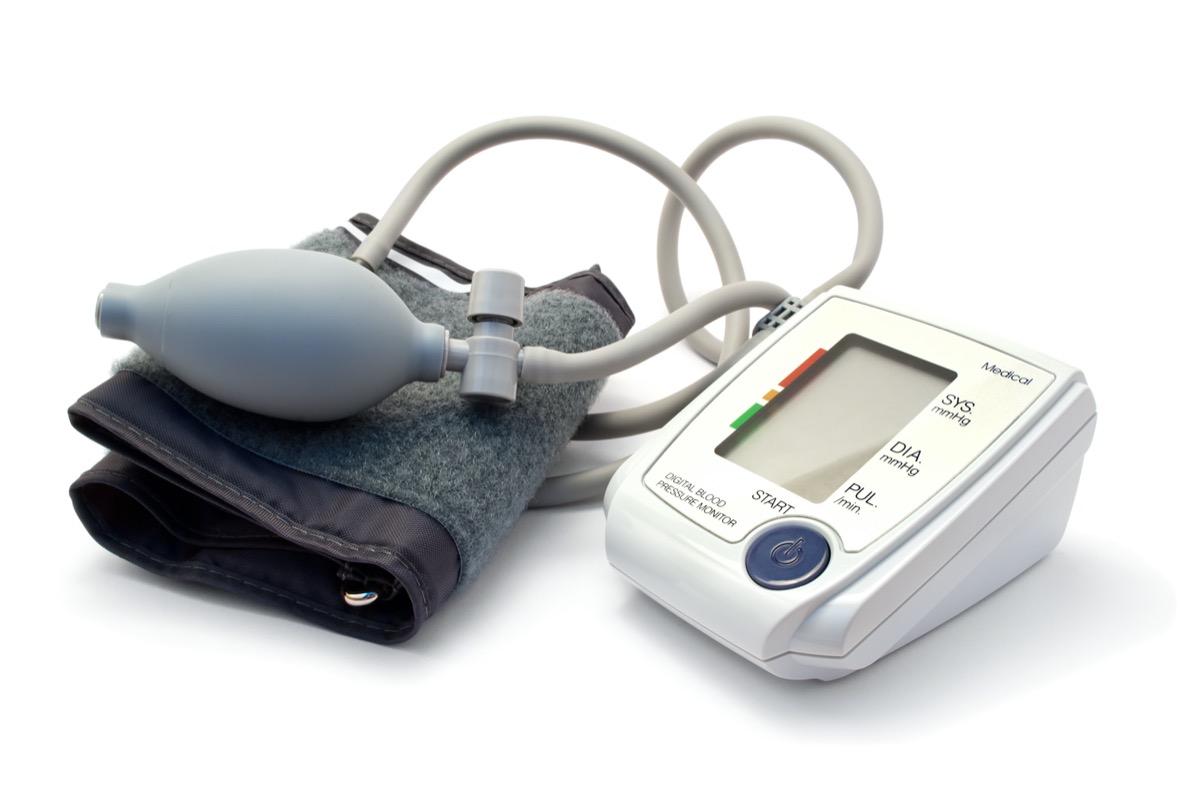When it comes to dementia, the best defense is a strong offense. According to a report published in The Lancet, experts have identified 12 risk factors that, if modified, could delay or prevent 40 percent of dementia cases. Read on to learn what changes you can make to your lifestyle now to slash your risk. And for more on staying sharp, You’re Twice as Likely to Develop Dementia If You Don’t Do This, Study Says. Excessive drinking has long been known to negatively affect cognition. A five-year study published by The Lancet looked at over 31 million hospitalized people and found that alcohol use disorders were associated with a higher risk of dementia. The study notes that alcohol use disorder was also present in 56.6 cases of “early onset dementias,” which it defines as anything under the age of 65. Researchers recommend limiting alcohol intake to 21 units (each unit being 10 ml of pure alcohol) per week to lower your risk of dementia. To learn more about how your nightly glass of wine affects you, this New Study Shows Even a Small Amount of Alcohol Ages Your Brain. A study published by The Journal of the American Medical Association (JAMA) Neurology looked at 28,815 older adults who had sustained a concussion. The study found that their risk of dementia doubled, with one in six of them developing dementia over an average follow-up of about four years. According to The Lancet, traumatic brain injuries are most often caused by motor vehicle accidents, contact sports, boxing, military service, horseback riding, and falls. Therefore, avoiding high-risk occupations or situations where concussions and brain injuries are more likely to be sustained will mitigate your risk of developing dementia. Pollution is not good for any aspect of your health including your mind. The Lancet says that studies have shown that “airborne particulate pollutants” have “[accelerated] neurodegenerative processes” in animals. One study published by the Journal of Alzheimer’s Disease found that exposure to certain pollutants was “associated with increased risk of dementia” in humans. Additionally, a 2019 study published by JAMA found that death and dementia associated with a particular pollutant are disproportionally experienced by Black individuals and people in socioeconomically disadvantaged communities. While avoiding these pollutants isn’t always possible, know that clean, fresh air is better for the health of your brain. And for another tip, This One Thing Everyone Does Could Lead to Dementia As You Age. Watching your blood pressure is a chore that many must take on as they grow older. And keeping a consistent, healthy blood pressure can help lower your risk of dementia, according to The Lancet. A study published by Neurology.org found that “elevated blood pressure during midlife, persistence of elevated blood pressure into late life, and, among nonhypertensives, a steep decline in blood pressure during mid- to late-life were associated with an increased dementia risk.” For tips on getting your number down, check out 25 Super Effective Ways to Lower Your Blood Pressure Naturally. This precaution may not seem obvious, but protecting your ears can contribute to a reduced risk of dementia. Hearing loss surprisingly accounted for the highest percentage—eight percent—reduction in dementia prevalence if eliminated, according to The Lancet. A study published in JAMA Otolaryngol Head Neck Surgery reviewed 36 studies and over 20,260 participants and found that age-related hearing loss was “significantly associated with decline in all main cognitive domains and with increased risk for cognitive impairment and incident dementia.” Another study published by JAMA Otolaryngol Head Neck Surgery found that the more your hearing declines, the more your chances of developing dementia increase. The study found a decrease in cognition with every 10 dB reduction in hearing. To minimize your risk of developing dementia, the Lancet Commission advises the use of hearing aids as needed and consistent protection from excessive noise exposure. According to The Lancet, “Smokers are at higher risk of dementia than non-smokers.” However, if you’re a smoker, it’s not too late to lower your risk. A study published by Wiley Periodicals found that men who had never smoked were 19 percent less likely to develop dementia than current smokers. The study also found that men who had quit smoking for at least four years were 14 percent less likely to develop dementia than those who were still smoking. Getting an education is beneficial for many reasons—one of them being that it lessens your likelihood of developing dementia. According to The Lancet, multiple studies support that “higher childhood education levels and lifelong higher educational attainment reduce dementia risk.” A study published by the National Academy of Sciences suggests that education earlier in life is more influential in mitigating the possibility of developing dementia, as overall cognitive ability increases with education until it reaches a plateau during late adolescence. Maintaining an active lifestyle is good for your overall wellness and can also contribute to a lower risk of dementia. According to The Lancet, studies of physical activity are complex, due to so many changing variables, but, multiple studies that span from one to 21 years “showed exercise to be associated with reduced risk of dementia.” To get started, check out The 50 Best 5-Minute Exercises Anyone Can Do. Obesity is on the rise in America. According to the Centers for Disease Control and Prevention (CDC), the prevalence of obesity in 1999-2000 was 30.5 percent and rose to 42.4 percent in 2017-2018. A study by the Alzheimer’s Association found that obesity, but not being overweight, was associated with late-life dementia. The Lancet Commission recommends reducing the chances of becoming obese by consuming healthy food and living in a healthy environment that promotes movement. And for more up-to-date information, sign up for our daily newsletter. The Lancet reports that “several studies suggest that less social contact increases the risk of dementia.” Additionally, being married is associated with a lower risk, likely due to the social benefits of marriage. A study published by the Journal of Neurology, Neurosurgery & Psychiatry found that, “compared with those who are married, lifelong single and widowed people have elevated risk.” Whatever your marital status, maintaining a social lifestyle—especially later in life—could keep you sharp for years to come. “Depression preceding dementia may be a causal risk factor for its onset,” reads the World Alzheimer Report 2014. There are many potential chemicals produced by depression that could contribute to the future onset of dementia. That’s why maintaining good mental health through therapy, medication, and forms of self-care can help lower your risk. If you do experience depression, you should talk to a therapist about how to manage your symptoms.ae0fcc31ae342fd3a1346ebb1f342fcb A study from the American Diabetes Association (ADA) found that type 2 diabetes was “associated with a 60 percent increased risk of any dementia in both sexes.” The ADA also found that the risk of developing dementia was greater in women with diabetes than in men with diabetes. According to The Lancet, the risk of dementia increases as the duration and severity of diabetes increases. To avoid developing diabetes, eat a healthy diet and stay active.











